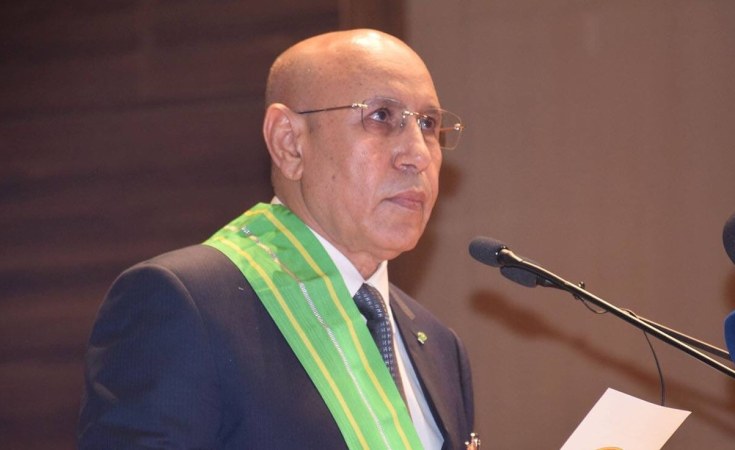Provisional results showed President Ghazouani is expected to win Saturday's election as counting was underway. The West African nation is seen as a hub of relative stability in a region characterized by much unrest.
Mauritania's President Mohamed Ould Ghazouani was in an early lead Sunday according to provisional results by the election commission, as counting was underway after Saturday's general elections.
He was leading with 49%, while his main rival, prominent anti-slavery activist Biram Dah Abeid, was at 22.68%, with around 6.49% of total votes counted by 0010 GMT.
"The last word belongs to the Mauritanian voters. I commit myself to respecting their choice," Ghazouani told reporters after casting his ballot Saturday.
Ghazouni faced six challengers in the general election but was widely expected to win.
The president has vowed, if reelected, to bring in more investments to the West African nation, where many people live in poverty. The country possesses mineral wealth and is set to become a gas producer soon.
Ghazouani has promised a gas-fired power plant from the Greater Tortue Ahmeyin (GTA) offshore gas project, which is expected to start production by the end of this year. He also promised to invest in renewable energy and increase gold, uranium and iron ore mining.
"We must not let ourselves be fooled by the slogans of the candidates who are not reassuring. Mauritania must vote for continuity and stability and its security in a troubled environment and it is not these candidates without experience in governance who will give us confidence," Marieme Brahim, a 38-year-old who voted for Ghazouni told AP news agency.
Security 'utmost priority'
The 67-year-old was first elected president in 2019. Though Mauritania's neighbors, such as Mali, have faced insurgency and military coups, the country has experienced relative political stability since Ghazouani's election, with no recent militant attack.
"Authorities are ready to face any attempt at creating disorder, as security is Mauritanians' utmost priority," Ghazouani said during an election rally. He has promised supporters a "resounding first-round victory."
Around 1.9 million people are eligible to vote in the country, which has a high youth unemployment rate and problems with corruption.
Polling stations opened 7 a.m. (0700 GMT) and close at 7 pm (1900 GMT). Official results are expected on Sunday or Monday. If the results are inconclusive, a second round would take place on July 14.
Who are the other candidates?
Among Ghazouani's election opponents were Abeid, lawyer Id Mohameden M'Bareck, economist Mohamed Lemine El Mourtaji El Wafi and Hamadi Sidi El Mokhtar of the Islamist Tewassoul party.
"I just voted for change. We have had enough of identical regimes which squander the people's assets and maintain corruption," 45-year-old Mohamed Lemine Ould Moktar who voted for an opposition candidate told AP.
Abeid was the runner-up in the last two elections and is challenging Ghazouani on his human rights record. He and conservative Mokhtar have both promised radical changes and an end to corruption. They have also questioned the credibility of elections and have accused the Independent National Electoral Commission (CENI) of not doing enough to avoid fraud.
"Everything indicates that people want change. I will have no problem recognising the results of a transparent election, but in case of fraud we'll not hesitate to call it a rigged election," Mokhtar said after voting. He was in third position with about 14% of the votes.
The campaigning has been more or less peaceful, barring some minor scuffles in the northern town of Nouadhibou, said the Interior Ministry.
The African Union, of which Ghazouani is the chairperson, has sent a 27-strong team of observers. The EU has sent three election experts.
Ghazouani "is likely to win a second term, probably in the first round," Carine Gazier, sub-Saharan Africa specialist at the Concerto consultancy, told Reuters news agency.
tg/kb (AFP, Reuters)


